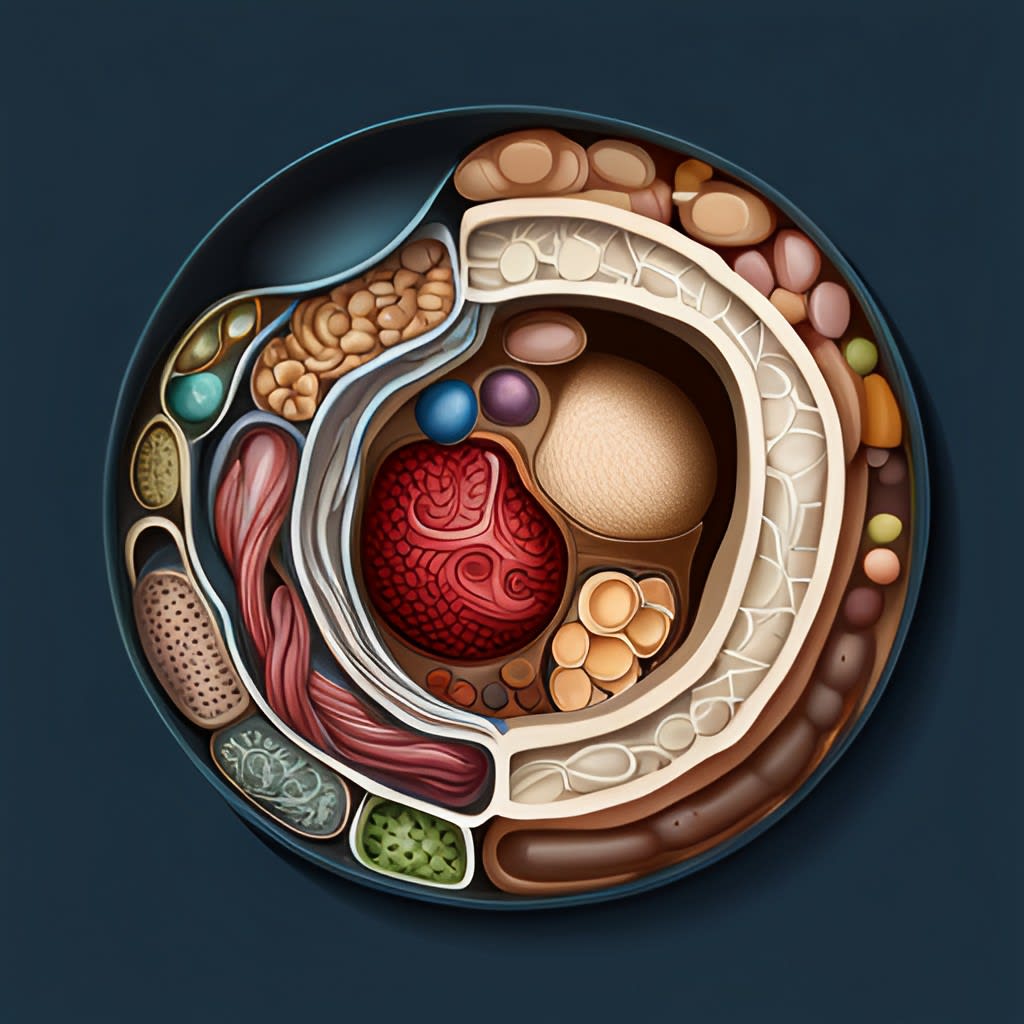Discover the Top Digestive System Issues that Qualify for Social Security Disability!
IBS, GERD & other digestive system diseases that can lead to ending up on social security disability.

1945
Discover the Top Digestive System Issues that Qualify for Social Security Disability!
Dealing with digestive system issues can be a real challenge. It's not just about the discomfort and pain – these problems can also affect your ability to work and earn a living. Social Security Disability benefits can provide financial support, but it's important to know which digestive disorders qualify. In this post, we'll explore some of the top digestive system issues that can make you eligible for these benefits. From chronic liver disease to inflammatory bowel disease, there are several conditions that the Social Security Administration recognizes as disabling. Read on to find out more.
Understanding Digestive System Issues
The digestive system plays a crucial role in our overall health and well-being. It is responsible for breaking down the food we eat, absorbing nutrients, and eliminating waste. However, there are times when the digestive system encounters issues that can have a significant impact on our daily lives. In this section, we will explore what the digestive system is and discuss some common digestive system issues.
What is the Digestive System?
The digestive system is a complex network of organs and tissues that work together to process the food we consume. It starts with the mouth, where food begins to break down through the process of chewing and mixing with saliva. From there, it travels down the esophagus, a muscular tube that connects the mouth to the stomach.
Once in the stomach, food is mixed with digestive juices and enzymes to further break it down. The partially digested food then moves into the small intestine, where most of the nutrients are absorbed into the bloodstream. The remaining undigested waste passes into the large intestine, where water is absorbed and the waste is formed into stool.
Common Digestive System Issues
Gastroesophageal Reflux Disease (GERD): GERD is a chronic digestive disorder characterized by the backward flow of stomach acid into the esophagus. It can cause symptoms such as heartburn, regurgitation, and difficulty swallowing.
Irritable Bowel Syndrome (IBS): IBS is a common digestive disorder that affects the large intestine. It can cause symptoms like abdominal pain, bloating, constipation, and diarrhea. While the exact cause of IBS is unknown, factors such as stress, certain foods, and hormonal changes may contribute to its development.
Crohn's Disease: Crohn's disease is a chronic inflammatory bowel disease that can affect any part of the digestive tract. It causes inflammation, leading to symptoms like abdominal pain, diarrhea, fatigue, and weight loss. Crohn's disease is believed to be an autoimmune disorder, where the immune system mistakenly attacks healthy cells in the digestive tract.
Ulcerative Colitis: Similar to Crohn's disease, ulcerative colitis is an inflammatory bowel disease that causes inflammation and ulcers in the lining of the colon and rectum. Symptoms include abdominal pain, diarrhea (often bloody), fatigue, and weight loss. The exact cause of ulcerative colitis is unknown, but it is thought to involve an abnormal immune response.
Celiac Disease: Celiac disease is an autoimmune disorder triggered by the ingestion of gluten, which is found in wheat, barley, and rye. When a person with celiac disease consumes gluten, it triggers an immune response that damages the lining of the small intestine. This can lead to symptoms like abdominal pain, bloating, diarrhea, and nutrient deficiencies.
Gallstones: Gallstones are hardened deposits that form in the gallbladder. They can vary in size and can cause symptoms such as abdominal pain, bloating, nausea, and vomiting. Gallstones are often formed when there is an imbalance in the substances that make up bile, a fluid produced by the liver to aid in digestion.
These are just a few examples of common digestive system issues. It is important to note that each condition varies in severity and treatment options. If you are experiencing persistent digestive symptoms, it is recommended to consult with a healthcare professional for an accurate diagnosis and appropriate management plan.
Understanding the complexities of the digestive system and the various issues that can arise is crucial for maintaining good digestive health. By staying informed and seeking appropriate medical care when needed, we can optimize our digestive health and overall well-being.
Social Security Disability and Digestive System Issues
Digestive system issues can significantly impact a person's daily life, making it challenging to work and earn a living. Fortunately, Social Security Disability benefits are available for individuals who are unable to work due to severe digestive system impairments. In this section, we will provide an overview of Social Security Disability and discuss how individuals with digestive system issues can qualify for these benefits.
Overview of Social Security Disability
Social Security Disability (SSD) is a federal program that provides financial assistance to individuals who are unable to work due to a disability. These benefits are designed to help individuals maintain a basic standard of living and cover their daily expenses. To qualify for SSD, applicants must meet specific criteria set by the Social Security Administration (SSA).
The SSA uses a five-step evaluation process to determine eligibility for SSD benefits. This process includes assessing the applicant's ability to work, the severity of their medical condition, and whether their impairment meets the criteria outlined in the SSA's Blue Book, which is a manual of disabling conditions.
Qualifying for Social Security Disability with Digestive System Issues
Digestive system issues encompass a wide range of conditions that can affect the functioning of the gastrointestinal tract. Some common digestive system impairments that may qualify for SSD benefits include inflammatory bowel disease (IBD), Crohn's disease, ulcerative colitis, gastric ulcers, and liver disease.
To qualify for SSD benefits with digestive system issues, applicants must provide substantial medical evidence to demonstrate the severity of their condition. This evidence may include medical records, laboratory test results, imaging studies, and statements from treating physicians. It is crucial to provide comprehensive documentation that clearly outlines the impact of the digestive system issues on the applicant's ability to work.
Applicants must also meet the eligibility criteria outlined by the SSA for digestive system impairments. The SSA's Blue Book includes specific guidelines for each condition, detailing the symptoms, diagnostic tests, and medical findings required to qualify for SSD benefits. It is essential to review the Blue Book to understand the specific requirements for the digestive system impairment being claimed.
In cases where an applicant's digestive system issue does not meet the exact criteria in the Blue Book, they may still be eligible for SSD benefits through a medical-vocational allowance. This allowance takes into consideration the applicant's age, education, work experience, and residual functional capacity (RFC), which refers to the individual's ability to perform work-related activities.
To determine an applicant's RFC, the SSA may request a consultative examination or seek additional medical opinions. It is crucial for applicants to cooperate fully with the SSA and provide all requested information to ensure an accurate evaluation of their disability claim.
In conclusion, Social Security Disability provides crucial financial support for individuals who are unable to work due to digestive system issues. By understanding the eligibility criteria and providing comprehensive medical evidence, individuals with severe digestive system impairments can increase their chances of qualifying for SSD benefits. Remember to consult with a qualified attorney or advocate who specializes in Social Security Disability to navigate the application process successfully.
Top Digestive System Issues that Qualify for Social Security Disability
Digestive system issues can have a significant impact on an individual's quality of life. These conditions not only cause discomfort and pain, but they can also lead to severe complications that may prevent individuals from being able to work. In some cases, these digestive system issues may qualify individuals for Social Security Disability benefits. In this section, we will explore some of the top digestive system issues that may qualify for Social Security Disability.
Inflammatory Bowel Disease (IBD)
Inflammatory Bowel Disease (IBD) is a group of conditions that cause chronic inflammation in the digestive tract. The two most common types of IBD are Crohn's Disease and Ulcerative Colitis. These conditions can cause symptoms such as abdominal pain, diarrhea, fatigue, and weight loss. In severe cases, individuals may require frequent hospitalizations and surgeries. The unpredictable nature of IBD can make it difficult for individuals to maintain consistent employment, making them eligible for Social Security Disability benefits.
Crohn's Disease
Crohn's Disease is a chronic inflammatory condition that primarily affects the gastrointestinal tract. It can cause symptoms such as abdominal pain, diarrhea, rectal bleeding, weight loss, and fatigue. The symptoms of Crohn's Disease can be unpredictable and may significantly impact an individual's ability to work. Individuals with severe cases of Crohn's Disease may require frequent hospitalizations, surgeries, and ongoing medical treatment, which can make it difficult to maintain consistent employment.
Ulcerative Colitis
Ulcerative Colitis is a chronic condition that causes inflammation and ulcers in the lining of the colon and rectum. Common symptoms of Ulcerative Colitis include abdominal pain, diarrhea, rectal bleeding, and weight loss. The symptoms of Ulcerative Colitis can vary in severity and may require ongoing medical treatment, hospitalizations, and surgeries. The unpredictable nature of this condition can make it challenging for individuals to maintain consistent employment, making them eligible for Social Security Disability benefits.
Chronic Liver Disease
Chronic Liver Disease refers to a range of conditions that affect the liver and can cause significant damage over time. Some common forms of chronic liver disease include cirrhosis, hepatitis, and non-alcoholic fatty liver disease. These conditions can cause symptoms such as fatigue, jaundice, abdominal pain, and fluid retention. In severe cases, chronic liver disease can lead to liver failure or liver cancer, making it difficult for individuals to work and qualify for Social Security Disability benefits.
Chronic Pancreatitis
Chronic Pancreatitis is a long-term inflammation of the pancreas. It can cause symptoms such as severe abdominal pain, nausea, vomiting, weight loss, and malnutrition. The chronic pain associated with this condition can make it challenging for individuals to perform daily activities, including work. Individuals with chronic pancreatitis may require ongoing medical treatment and pain management, which can impact their ability to maintain consistent employment.
Gastroparesis
Gastroparesis is a condition that affects the movement of the muscles in the stomach, causing delayed emptying. Common symptoms of gastroparesis include nausea, vomiting, abdominal pain, bloating, and early satiety. The symptoms of gastroparesis can be unpredictable and may fluctuate in severity. Individuals with severe gastroparesis may have difficulty maintaining consistent employment due to the unpredictable nature of their symptoms.
Celiac Disease
Celiac Disease is an autoimmune disorder that causes damage to the small intestine when gluten is consumed. Common symptoms of celiac disease include diarrhea, abdominal pain, bloating, and weight loss. Individuals with celiac disease must adhere to a strict gluten-free diet to manage their symptoms effectively. However, even with dietary restrictions, some individuals may experience ongoing symptoms that can impact their ability to work.
In conclusion, various digestive system issues can qualify individuals for Social Security Disability benefits. Conditions such as Inflammatory Bowel Disease, Crohn's Disease, Ulcerative Colitis, Chronic Liver Disease, Chronic Pancreatitis, Gastroparesis, and Celiac Disease can significantly impact an individual's ability to maintain consistent employment due to the unpredictable nature of symptoms, frequent hospitalizations, surgeries, and ongoing medical treatment. If you or someone you know is experiencing any of these digestive system issues, it may be worth exploring the possibility of applying for Social Security Disability benefits.
Conclusion
In conclusion, understanding the top digestive system issues that qualify for Social Security Disability is crucial for individuals seeking assistance and support. Digestive system disorders, such as inflammatory bowel disease, liver disease, and chronic pancreatitis, can significantly impact a person's daily life and ability to work. By familiarizing oneself with the qualifying conditions and gathering relevant medical evidence, individuals can increase their chances of successfully applying for Social Security Disability benefits. Remember to consult with a qualified attorney or advocate to navigate the complex process and ensure the best possible outcome.
About the Creator
Jason Baril
Hello, everyone! My name is Jason Baril, and I'm excited to share my story with you all. attorney, I have a few passions that keep me busy - law, pickleball, technology, and writing.






Comments
There are no comments for this story
Be the first to respond and start the conversation.